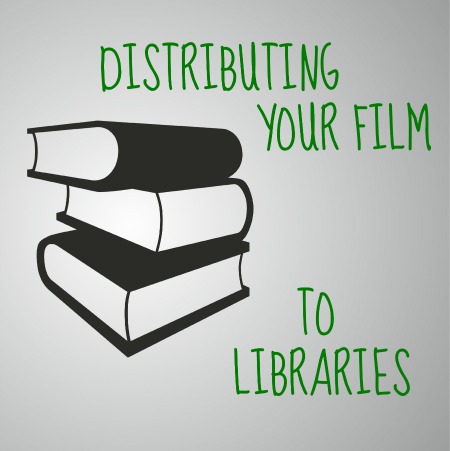How to Get a Dvd University Library Review
Distributing Your Film To Libraries
What Y'all Demand To Know About Copyright Problems, Showtime Sale Doctrine & Public Performance Licensing

Distributing your pic to libraries: As you consider your distribution strategy for your documentary, one market place to consider - in addition to schools and universities - is the library market.
Many filmmakers presume that libraries are required to pay a college price for their films in the form of a public functioning license. But that isn't ever the case. In fact, it's the exception rather than the rule.
We asked Randy Pitman, Publisher/Editor of the Video Librarian publication, if he could help sort through some of the common questions (and misconceptions) filmmakers have about marketing and selling their films to libraries.
Interview with Randy Pitman, Publisher/Editor of Video Librarian
[Question] Tell me a little near yourself and your job. How long have you been with Video Librarian?
[Randy Pitman]I am the publisher and editor of Video Librarian, a video review magazine for libraries, which reviews movies, TV serial, documentaries, how-to's, children'southward titles, music video, and anime on DVD and Blu-ray. I started Video Librarian in 1986 as a newsletter with x reviews; today, it is a full-color magazine with over 200 reviews in each issue.
[Question] What practice filmmakers need to know near Video Librarian?
[Randy Pitman]Nosotros are the only library trade magazine devoted exclusively to video reviews and news.

[Question] There's a lot of confusion in the filmmaking earth about copyright and public performance licensing. What are the laws regarding how libraries can utilize films and documentaries?
[Randy Pitman]The Showtime Sale Doctrine allows libraries to broadcast to patrons any legally caused DVD or Blu-ray title, which would include retail copies purchased from retailers or wholesalers. These "home video" copies can besides be screened in the classroom as long every bit the showing is tied to the curriculum and occurs in a face-to-face teaching state of affairs (only a Disney movie shown equally a advantage on a Friday afternoon, on the other hand, would be a clear violation of copyright law).
[Question] What's the best mode for filmmakers to reach the library market?
[Randy Pitman]Library collections are driven by ii major factors: reviews and patron demand. Titles that receive a lot of publicity—a Michael Moore documentary, for instance—will likely be automatically selected for acquisition by a librarian or will be requested by a patron. But for many lesser-known titles, reviews tin be very important. I would recommend that filmmakers submit titles for review to Video Librarian, Booklist (which reviews video online, just not in their print magazine), Library Journal and School Library Periodical. For Video Librarian, filmmakers can see our submission guidelines at world wide web.videolibrarian.com. Our marketing manager would besides want me to add together that display advertising is also effective (a cocky-serving observation, no doubt, but self-serving can also exist truthful).
[Question] How big is the library market? (including public, university, etc.)?
[Randy Pitman]The American Library Association lists a total figure for libraries of 119,987. Nigh 100,000 of these are M-12 school libraries, a little over three,500 are colleges and universities, and nigh 9,000 are public libraries. Technically, these numbers represent the library marketplace. In reality, even so, the number of actual buyers is much smaller, due to several factors, ranging from an outdated bias toward print (surprisingly, some libraries however do not buy video) to a poor collection evolution decision to only purchase popular movies. A Disney moving picture will likely sell thousands of units in the library market, while a festival award-winning documentary will exist more than likely to sell in the hundreds.
[Question] Filmmakers are often advised that if their films accept a strong educational component, that it can exist a better concern decision to go on it off the retail market ($20/each) and instead simply offering "educational/institutional" copies ($175 - $350/each). Are libraries less/more inclined to purchase an institutional copy vs a retail copy? What advice would you give to filmmakers on this point?
[Randy Pitman] Librarians spend taxpayer money, then information technology is non only wise merely also fiscally responsible to purchase a title for the best toll bachelor, depending on what rights the library needs. The majority of public libraries, for instance, are interested in circulating DVD and Blu-ray titles to patrons rather than holding public screenings, so it would brand no sense for them to purchase a version with public performance rights if a retail copy was also available. Filmmakers recall that libraries should pay more because the potential audience is larger. This argument may exist defensible, but information technology'southward not the law (nor is it the general dominion for other formats: libraries not only don't pay college prices for books than consumers practise, only they buy from wholesalers and mostly pay less).
For a movie with a modest potential audience, it may make skillful economic sense for a filmmaker to set up the price higher, especially for, say, ethnographic films that will primarily be used in college/university settings. The important matter to recollect is to maintain sole control of distribution because once a title is available at retail, all bets are off (Amazon volition not grill a customer as to whether they are an individual or an institution).
[Question] Annihilation else documentary filmmakers need to know most the library market?
[Randy Pitman] Libraries take always played an of import cultural office in educating, entertaining, and informing citizens and students. Cheers to the technological advancements of the past 30 years, documentaries are now much more widely attainable and also have a higher profile. Wonderful documentaries still struggle in the market—where the indicate to noise ratio is discouraging due to our constantly blinking consumer gild—but I practice hope that they will continue to find an appreciative home in libraries, where they can enrich many lives. And from a purely practical standpoint, libraries are not bad customers: they normally pay their bills on fourth dimension and well-nigh never skip town.
About Randy Pitman

Randy Pitman is the editor and publisher of Video Librarian, a video review magazine for libraries, which reviews movies, Television receiver serial, documentaries, how-to's, children'southward titles, music video, and anime on DVD and Blu-ray. He started Video Librarian in 1986 as a newsletter with x reviews; today, information technology is a full-color mag with over 200 reviews in each issue. Video Librarian is the only library trade mag devoted exclusively to video reviews and news.
www.videolibrarian.com
Your Feel
Do you take any feel distributing your film to libraries or educational institutions? Delight share below in the comment department.
Filmmaking Quick Links

Ready To Make Your Dream Documentary?
Sign up for our exclusive 7-day crash class and acquire step-by-stride how to make a documentary from idea to completed movie!
Return Home
Source: https://www.desktop-documentaries.com/distributing-your-film-to-libraries.html
0 Response to "How to Get a Dvd University Library Review"
Post a Comment